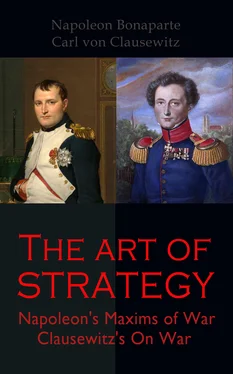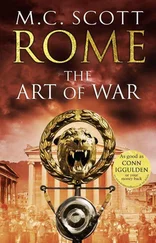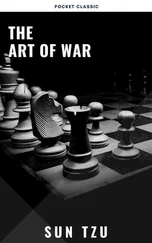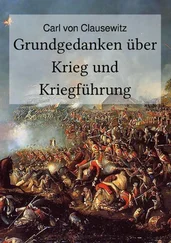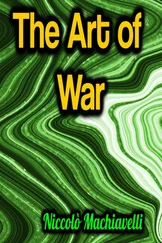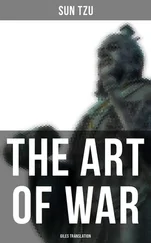Taking this point of view, there is a possibility afforded of a satisfactory, that is, of a useful, theory of the conduct of War, never coming into opposition with the reality, and it will only depend on rational treatment to bring it so far into harmony with action that between theory and practice there shall no longer be that absurd difference which an unreasonable theory, in defiance of common sense, has often produced, but which, just as often, narrow-mindedness and ignorance have used as a pretext for giving way to their natural incapacity.
29. THEORY THEREFORE CONSIDERS THE NATURE OF ENDS AND MEANS—ENDS AND MEANS IN TACTICS.
Theory has therefore to consider the nature of the means and ends.
In tactics the means are the disciplined armed forces which are to carry on the contest. The object is victory. The precise definition of this conception can be better explained hereafter in the consideration of the combat. Here we content ourselves by denoting the retirement of the enemy from the field of battle as the sign of victory. By means of this victory strategy gains the object for which it appointed the combat, and which constitutes its special signification. This signification has certainly some influence on the nature of the victory. A victory which is intended to weaken the enemy’s armed forces is a different thing from one which is designed only to put us in possession of a position. The signification of a combat may therefore have a sensible influence on the preparation and conduct of it, consequently will be also a subject of consideration in tactics.
30. CIRCUMSTANCES WHICH ALWAYS ATTEND THE APPLICATION OF THE MEANS.
As there are certain circumstances which attend the combat throughout, and have more or less influence upon its result, therefore these must be taken into consideration in the application of the armed forces.
These circumstances are the locality of the combat (ground), the time of day, and the weather.
The locality, which we prefer leaving for solution, under the head of “Country and Ground,” might, strictly speaking, be without any influence at all if the combat took place on a completely level and uncultivated plain.
In a country of steppes such a case may occur, but in the cultivated countries of Europe it is almost an imaginary idea. Therefore a combat between civilised nations, in which country and ground have no influence, is hardly conceivable.
The time of day influences the combat by the difference between day and night; but the influence naturally extends further than merely to the limits of these divisions, as every combat has a certain duration, and great battles last for several hours. In the preparations for a great battle, it makes an essential difference whether it begins in the morning or the evening. At the same time, certainly many battles may be fought in which the question of the time of day is quite immaterial, and in the generality of cases its influence is only trifling.
Still more rarely has the weather any decisive influence, and it is mostly only by fogs that it plays a part.
34. END AND MEANS IN STRATEGY.
Strategy has in the first instance only the victory, that is, the tactical result, as a means to its object, and ultimately those things which lead directly to peace. The application of its means to this object is at the same time attended by circumstances which have an influence thereon more or less.
35. CIRCUMSTANCES WHICH ATTEND THE APPLICATION OF THE MEANS OF STRATEGY.
These circumstances are country and ground, the former including the territory and inhabitants of the whole theatre of war; next the time of the day, and the time of the year as well; lastly, the weather, particularly any unusual state of the same, severe frost, &c.
36. THESE FORM NEW MEANS.
By bringing these things into combination with the results of a combat, strategy gives this result—and therefore the combat—a special signification, places before it a particular object. But when this object is not that which leads directly to peace, therefore a subordinate one, it is only to be looked upon as a means; and therefore in strategy we may look upon the results of combats or victories, in all their different significations, as means. The conquest of a position is such a result of a combat applied to ground. But not only are the different combats with special objects to be considered as means, but also every higher aim which we may have in view in the combination of battles directed on a common object is to be regarded as a means. A winter campaign is a combination of this kind applied to the season.
There remain, therefore, as objects, only those things which may be supposed as leading directly to peace, Theory investigates all these ends and means according to the nature of their effects and their mutual relations.
37. STRATEGY DEDUCES ONLY FROM EXPERIENCE THE ENDS AND MEANS TO BE EXAMINED.
The first question is, How does strategy arrive at a complete list of these things? If there is to be a philosophical inquiry leading to an absolute result, it would become entangled in all those difficulties which the logical necessity of the conduct of War and its theory exclude. It therefore turns to experience, and directs its attention on those combinations which military history can furnish. In this manner, no doubt, nothing more than a limited theory can be obtained, which only suits circumstances such as are presented in history. But this incompleteness is unavoidable, because in any case theory must either have deduced from, or have compared with, history what it advances with respect to things. Besides, this incompleteness in every case is more theoretical than real.
One great advantage of this method is that theory cannot lose itself in abstruse disquisitions, subtleties, and chimeras, but must always remain practical.
38. HOW FAR THE ANALYSIS OF THE MEANS SHOULD BE CARRIED.
Another question is, How far should theory go in its analysis of the means? Evidently only so far as the elements in a separate form present themselves for consideration in practice. The range and effect of different weapons is very important to tactics; their construction, although these effects result from it, is a matter of indifference; for the conduct of War is not making powder and cannon out of a given quantity of charcoal, sulphur, and saltpetre, of copper and tin: the given quantities for the conduct of War are arms in a finished state and their effects. Strategy makes use of maps without troubling itself about triangulations; it does not inquire how the country is subdivided into departments and provinces, and how the people are educated and governed, in order to attain the best military results; but it takes things as it finds them in the community of European States, and observes where very different conditions have a notable influence on War.
39. GREAT SIMPLIFICATION OF THE KNOWLEDGE REQUIRED.
That in this manner the number of subjects for theory is much simplified, and the knowledge requisite for the conduct of War much reduced, is easy to perceive. The very great mass of knowledge and appliances of skill which minister to the action of War in general, and which are necessary before an army fully equipped can take the field, unite in a few great results before they are able to reach, in actual War, the final goal of their activity; just as the streams of a country unite themselves in rivers before they fall into the sea. Only those activities emptying themselves directly into the sea of War have to be studied by him who is to conduct its operations.
Читать дальше
